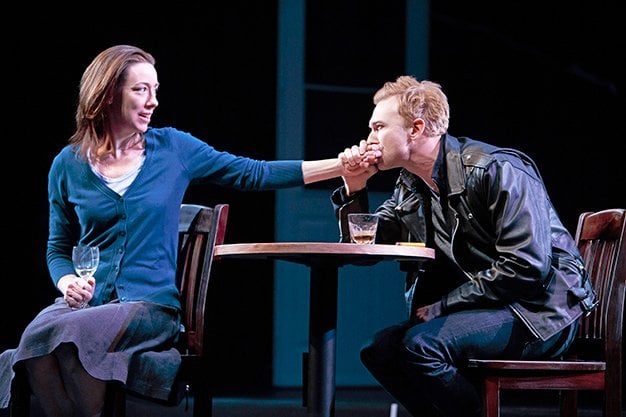
HARPER REGAN by Simon Stephens (Canadian Stage). At the Bluma Appel Theatre (27 Front East). To March 22. $30-$99. 416-368-3110, canadianstage.com. See Continuing. Rating: NNN
Though she only travels several hundred kilometres, the journey taken by the title character in Harper Regan is epic.
In Simon Stephens‘s play, written in an intentionally disjointed style, Harper (the excellent Molly Parker) abruptly leaves husband (Alex Poch-Goldin), daughter (Vivien Endicott-Douglas) and boss (Hardee T. Lineham) to attend her dying father in another city.
Harper comes to terms with her life, past and present, in a voyage of the soul more than of the body. It’s not a fully satisfying expedition, in part because of the writing, but also due to director Matthew Jocelyn‘s production, which is often exciting but ultimately fails to fill in all the narrative’s emotional gaps.
Working with set designer Debra Hanson and lighting designer Michael Walton, Jocelyn moves the performing space into the audience’s lap, building out from the Bluma Appel‘s conventional stage to give us a close-up look at the interactions between characters. Harsh bursts of light and Thomas Ryder Payne‘s jarring sound design punctuate the scene changes.
Many of the individual confrontations, all of which involve Harper, work well, beginning with her uncomfortable exchange with Lineham’s tyrannical, sexually suggestive employer. Poch-Goldin’s cheery husband hides an important secret we eventually discover, but he’s even better as a man who has an afternoon encounter with Harper this second guy’s warm and inviting but also slightly off-putting.
Other men figure importantly in Harper’s trip of self-discovery: Izaak Smith as a student with whom she strikes up a conversation, and, in one of the production’s most finely crafted scenes, Philip Riccio as a sleazy, angry sexual aggressor in a bar.
Lynne Griffin also scores as Harper’s estranged mother, a not very maternal figure who believes a different truth than the one held by her daughter. It’s not until the end of the play, unfortunately, that Endicott-Douglas convinces us that she’s connected to her character’s unsettled life.
Another problem is that pretty much everyone in this England-set play has a North American accent. The class differences between the characters are lost, and with that some of the tension between them.
But you won’t forget Parker’s extraordinary, complex performance in the central role. Her face always full of mixed feelings, this Harper grows by subtle but powerful increments into a woman who sees hope in the future, for herself and with her family.












